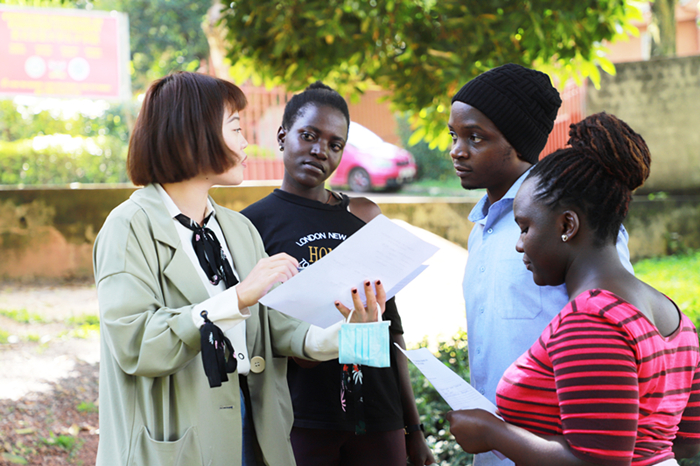|
||||||||||
| Home Nation World Business Opinion Lifestyle ChinAfrica Multimedia Columnists Documents Special Reports |
|
||||||||||
| Home Nation World Business Opinion Lifestyle ChinAfrica Multimedia Columnists Documents Special Reports |
| High-level exchanges |
| Remarkable Milestone |
| Growing friendship marks six decades of China-Uganda ties |
| CHINAFRICA 丨VOL. 14 October 2022 ·2022-09-22 |

Mugisha Wilberforce Fred, charge d’affaires at the Ugandan Embassy in China (DONG NING)
The 60th anniversary of the establishment of diplomatic ties between China and Uganda falls in October this year. On this important occasion, in a conversation with ChinAfrica, Mugisha Wilberforce Fred, charge d’affaires at the Ugandan Embassy in China, discussed topics including people-to-people contacts and dialogues between political parties of the two countries, as well as the so-called “debt trap.” Edited excerpts of his views follow:
ChinAfrica: What are the highlights of China-Uganda bilateral relations over the past 60 years?
Mugisha Wilberforce Fred: First of all, the People’s Republic of China and the Republic of Uganda are celebrating 60 years of diplomatic relations this year. Uganda opened the embassy in China just nine days after we had gained our independence from the former colonial power, the United Kingdom. Since that time, the relationship has grown from strength to strength. One of the most important highlights is the number of visits that have been exchanged between the high officials of governments on both sides ever since our independence up to the recent past, till the beginning of COVID-19 pandemic, to be precise.
During the last visit of Ugandan President Yoweri Museveni to China in 2019, the relationship, which was already cordial, was elevated to the Comprehensive Cooperative Partnership. So, as we talk, the level of relationship between my country and your country is at the highest, and this has come with a number of benefits.
The 60-year journey has been remarkable in the areas ranging from education to infrastructure corporation, sharing of science and technology, and even people-to-people exchanges. Today when you go to the capital and other cities in Uganda, you find many Chinese people from businesses, academia and other walks of life. This was not the case in the beginning, because with Uganda being a landlocked country far from China, we didn’t see many Chinese in our capital or other cities. But when you go there today, you find a big population of Chinese people, and this, of course, comes with exchange of information, exchange of knowledge, exchange of culture, and all of that benefits people.
In which sectors do you think the two countries need to strengthen cooperation?
There are a multitude of areas, including science and technology exchange and cultural exchange. As you know, a number of Ugandans have studied in China, both via self-sponsorship and through government sponsorship offered by China to the government of Uganda. We have hundreds of students who have benefited from such programmes, and this is how you can consolidate and solidify the relationship - when people meet, talk and exchange.
Today in my country, we have a number of institutions, namely Luyanzi Institute of Technology that trains young Ugandans in practical skills, the Confucius Institute found in Makerere University which teaches the Chinese language, to mention but a few. So, you would be surprised that now in Uganda, a big number of people speak the Chinese language. That’s one of the landmark achievements, and in the long run, we are looking forward to this relationship growing even stronger, because if you are able to communicate with each other, life becomes easy as you can do more than when you can’t communicate.

A Chinese teacher talks to her students in the Confucius Institute in Makerere University, Kampala, Uganda, on April 19 (XINHUA)
China and Uganda have been active in exchanges between political parties, namely the Communist Party of China (CPC) and the National Resistance Movement (NRM). How do you think this can benefit both countries?
The CPC is older than my country’s NRM. We all know the history of the revolution. Both parties have roots in revolution, people’s struggle, people’s war, where they started political participation. When that failed, they resorted to arms in the mass way, and finally they changed the political power that was oppressive and came into government. To that extent, the CPC, since 1949, has done tremendous work, and the country has made good progress. For those who have been following trends, when you look at the development trend of China after 1949, the development now is so tremendous.
On the other hand, the NRM in Uganda took state power in 1986. So, you can see it has relatively short time, and there are a lot of lessons to learn from the CPC. We have had big exchanges, and we have had top cadres in our country who visited China to study, with the intention of wanting to know how the CPC has managed to make this tremendous progress within a relatively short time. By using some of these lessons, we will be able to develop our country, of course with Ugandan characteristics. So there is a lot the CPC can offer; in turn, there is also a lot the CPC can learn from our people and our revolution. So, I think there are a lot of benefits for both sides.
What is your opinion about some people’s view of the so-called “debt trap” in Africa caused by Chinese loans?
It’s an interesting question: It presupposes that some African governments are not responsible for their decisions, or they go into agreements without understanding their implications. If that is the assumption, then it is a wrong assumption, because we have responsible governments in African countries that go out and engage with different international organisations and countries including China and get loans for economic development in their respective countries. So, to say Chinese loans are a trap for African countries is equal to saying that the responsible governments in those African countries don’t know what they are doing. It is derogatory.
However, of course, there are special circumstances, for example, the world was hit by the COVID-19 pandemic. This has negatively impacted the economies of many countries in the world. If such circumstances happen, of course you have to pay the debt and that becomes a problem. We have seen this happen in Sri Lanka, which is not in Africa. We have seen this happen to a number of other countries. You know a number of European countries that became bankrupt, and they had to renegotiate the terms of payments. This can also happen to a number of African countries, but it does not negate the fact that in Africa you have responsible governments which negotiate the loans based on the principles of development and when there are issues, they can renegotiate it.
So, I don’t agree with that assumption. It’s wrong. We have responsible governments. They represent the people in their respective countries, and they negotiate having that in mind.
| About Us | Contact Us | Advertise with Us | Subscribe |
| Copyright Beijing Review All rights reserved 京ICP备08005356号-5 京公网安备110102005860号 |